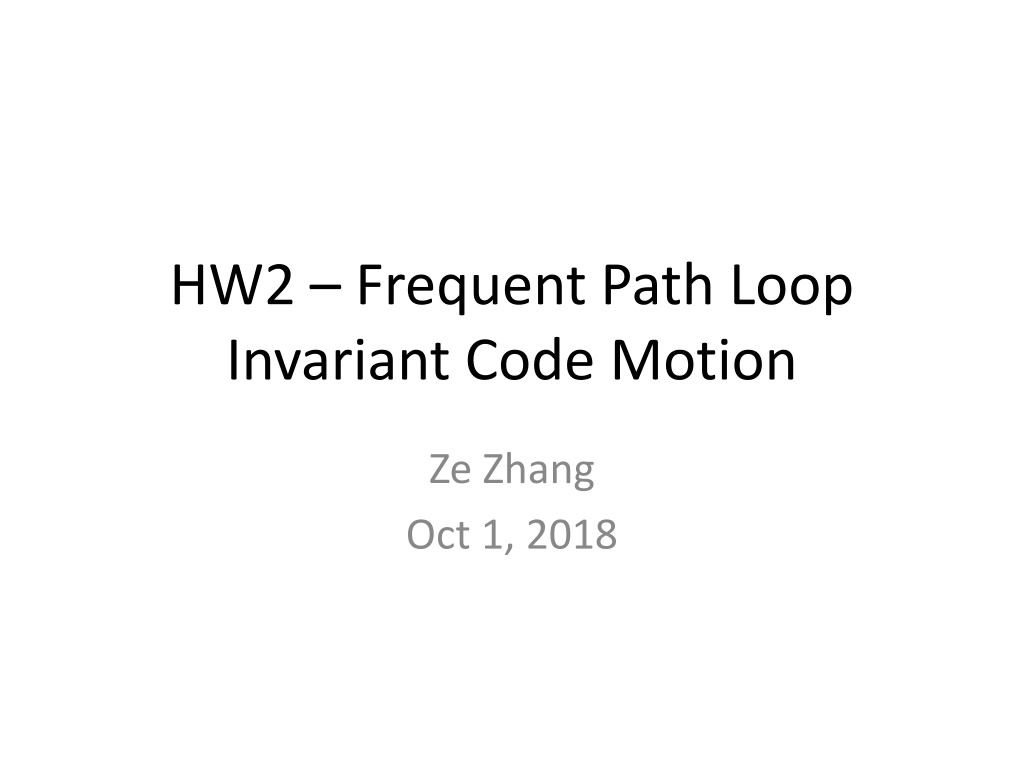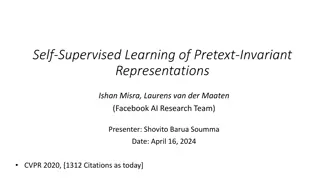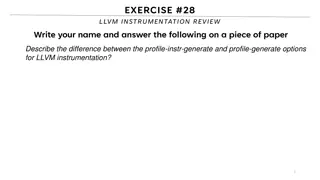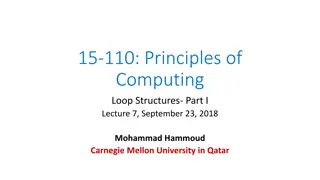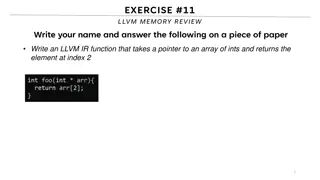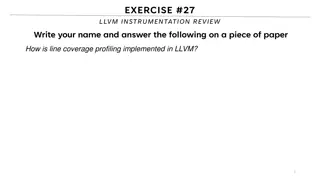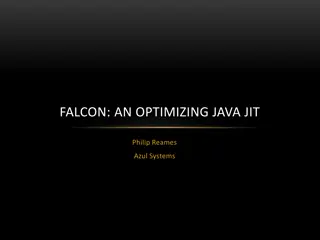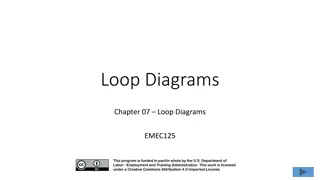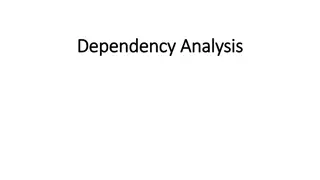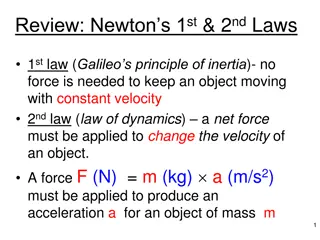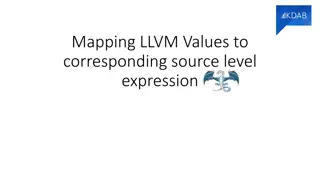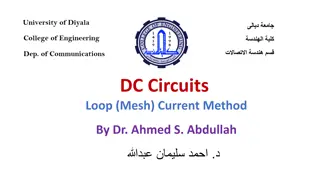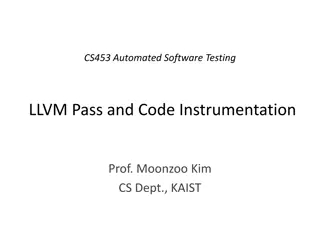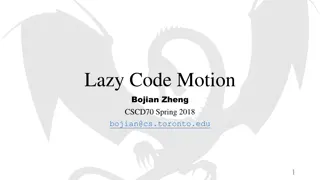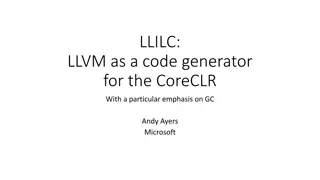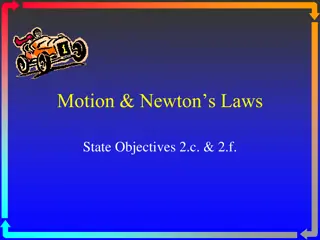Loop Invariant Code Motion (LICM) in LLVM
Loop Invariant Code Motion (LICM) is a technique used in LLVM to move operations that do not change within a loop outside of the loop, improving performance by executing them only once per loop iteration. This process must be done carefully to handle memory operations and operations that are not executed every iteration.
Download Presentation

Please find below an Image/Link to download the presentation.
The content on the website is provided AS IS for your information and personal use only. It may not be sold, licensed, or shared on other websites without obtaining consent from the author.If you encounter any issues during the download, it is possible that the publisher has removed the file from their server.
You are allowed to download the files provided on this website for personal or commercial use, subject to the condition that they are used lawfully. All files are the property of their respective owners.
The content on the website is provided AS IS for your information and personal use only. It may not be sold, licensed, or shared on other websites without obtaining consent from the author.
E N D
Presentation Transcript
HW2 Frequent Path Loop Invariant Code Motion Ze Zhang Oct 1, 2018
Loop Invariant Code Motion (LICM) Move operations whose source operands do not change within the loop to the loop preheader Execute them only 1x per invocation of the loop Be careful with memory operations! Be careful with ops not executed every iteration for (int i = 0; i < n; i++) { x = y + z; a[i] = 6 * i + x * x; } LICM code exists in LLVM! /lib/Transforms/Scalar/LICM.cpp 1
Loop Invariant Code Motion (LICM) Move operations whose source operands do not change within the loop to the loop preheader Execute them only 1x per invocation of the loop Be careful with memory operations! Be careful with ops not executed every iteration for (int i = 0; i < n; i++) { x = y + z; a[i] = 6 * i + x * x; } x = y + z; t1 = x * x; for (int i = 0; i < n; i++) { a[i] = 6 * i + t1; } LICM code exists in LLVM! /lib/Transforms/Scalar/LICM.cpp 2
Your Assignment: Frequent Path LICM r1 = &A r4 = load(r1) r7 = r4 * 3 r3 = r3 + r5 1 r2 = r2 + 1 store (r2, r1) 100 1 r8 = r2 + 7 store (r3, r8) 3
Your Assignment: Frequent Path LICM Cannot perform LICM on load, because of the store-load dependency r1 = &A r4 = load(r1) r7 = r4 * 3 r3 = r3 + r5 1 r2 = r2 + 1 store (r2, r1) 100 1 r8 = r2 + 7 store (r3, r8) 4
Your Assignment: Frequent Path LICM Cannot perform LICM on load, because of the store-load dependency r1 = &A But profile data says that the store rarely happens r4 = load(r1) r7 = r4 * 3 r3 = r3 + r5 1 r2 = r2 + 1 store (r2, r1) 100 1 r8 = r2 + 7 store (r3, r8) 5
Your Assignment: Frequent Path LICM Cannot perform LICM on load, because of the store-load dependency r1 = &A But profile data says that the store rarely happens r4 = load(r1) r7 = r4 * 3 r3 = r3 + r5 1 r2 = r2 + 1 store (r2, r1) 100 Frequent Path LICM: 1) Ignore infrequent dependence between loads and stores 1 r8 = r2 + 7 store (r3, r8) 6
Your Assignment: Frequent Path LICM Cannot perform LICM on load, because of the store-load dependency r1 = &A But profile data says that the store rarely happens r4 = load(r1) r7 = r4 * 3 r3 = r3 + r5 1 r2 = r2 + 1 store (r2, r1) 100 Frequent Path LICM: 1) Ignore infrequent dependence between loads and stores 2) Perform LICM on load 1 r8 = r2 + 7 store (r3, r8) 7
Your Assignment: Frequent Path LICM Cannot perform LICM on load, because of the store-load dependency r1 = &A But profile data says that the store rarely happens r4 = load(r1) r7 = r4 * 3 r3 = r3 + r5 1 r2 = r2 + 1 store (r2, r1) 100 Frequent Path LICM: 1) Ignore infrequent dependence between loads and stores 2) Perform LICM on load 3) Perform LICM on any consumers of the load that become invariant 1 r8 = r2 + 7 store (r3, r8) 8
Your Assignment: Frequent Path LICM Cannot perform LICM on load, because of the store-load dependency r1 = &A But profile data says that the store rarely happens r4 = load(r1) r7 = r4 * 3 r3 = r3 + r5 1 r2 = r2 + 1 store (r2, r1) r4 = load(r1) r7 = r4 * 3 100 Frequent Path LICM: 1) Ignore infrequent dependence between loads and stores 2) Perform LICM on load 3) Perform LICM on any consumers of the load that become invariant 4) Insert fix-up code to restore correct execution 1 r8 = r2 + 7 store (r3, r8) 9
Your Assignment: Frequent Path LICM r1 = &A r4 = load(r1) r7 = r4 * 3 r1 = &A r4 = load(r1) r7 = r4 * 3 r3 = r3 + r5 r3 = r3 + r5 1 1 r2 = r2 + 1 store (r2, r1) r4 = load(r1) r7 = r4 * 3 r2 = r2 + 1 store (r2, r1) 100 100 1 1 r8 = r2 + 7 store (r3, r8) r8 = r2 + 7 store (r3, r8) Before FPLICM After FPLICM 10
Your Assignment: Frequent Path LICM Identify the frequent path within the loop Find store instructions among all infrequent BBs and their dependent load instructions in frequent BBs destination operand of infrequent store = source operand of frequent load Hoist the load instruction Hoist consumers of the load that become invariant* Replicate all hoisted instructions in the infrequent path 11
LLVM Code of Interest The following slides present code from the LLVM codebase that may help you with HW2. Disclaimers: Use of this code is by no means required. There are many ways to do this assignment. You are free to use any other code that exists in LLVM 6.0.1 or that you develop. Read the documentation/source before asking for help! http://llvm.org/docs/ProgrammersManual.html#helpful- hints-for-common-operations 12
Code: Manipulating Basic Blocks SplitBlock( ) splits a BB at a specified instr, returns ptr to new BB that starts with the instr, connects the BBs with an unconditional branch // I is an Instruction* BasicBlock *BB1 = I->getParent(); BasicBlock *BB3 = SplitBlock(BB1, I); BasicBlock *BB2 = SplitEdge(BB1, BB3); SplitEdge( ) will insert a BB between two specified BBs Code found in: <llvm-src- root>/include/llvm/Transforms/U tils/BasicBlockUtils.h <llvm-src- root>/lib/Transforms/Utils/Basi cBlockUtils.cpp 13
Code: Creating and Inserting Instructions Various ways to create & insert instructions // 1) create load, insert at end of // specified basic block LoadInst *LD = new LoadInst(Val, loadflag , BB1); Hint: Instructions have a clone() member function // 2) create branch using Create // method, insert before BB1 s // terminating instruction Branch::Create(BB1, BB2, flag, BB1->getTerminator()); See specific instruction constructors/member functions in: <llvm-src- root>/include/llvm/IR/Instruction s.h // 3) create a store inst that stores // result of LD to some variable // (related to next slide) StoreInst *ST = new StoreInst(LD, var); // inserting store into code ST->insertAfter(LD); See general instruction functions available to all instructions in: <llvm-src- root>/include/llvm/IR/Instruction .h 14
Code: Creating Variables // 1) Create a variable in the // function Entry block AllocaInst *Val = new AllocaInst( I->getType(), 0, Entry->getTerminator() ); Use AllocaInst to allocate space on the function s stack frame for a variable // 2) store to the variable StoreInst *ST = new StoreInst( Result, Val, Entry->getTerminator() ); 15
Important: Maintaining SSA Form Static Single Assignment form requires unique destination registers for each instruction Replicated instructions in your infrequent BB will write to different regs compared to the instructions in the preheader! Store results of hoisted instrs to stack variables (see prev. slide) Make sure AllocaInst sare in function s entry BB! 16
Related Files run.sh List of commands used in HW2 Project Template HW2PASS.cpp: Mostly from current LLVM LICM Implementation. runOnLoop( ) hoistRegion( ) hoist( ) Benchmarks 6 correctness tests + README (Required) Only need to hoist the dependent load instructions Must generate the correct output after applying your FPLICM pass 4 performance tests + README (Optional) Hoist as many instructions as possible Correctness first, then the performance 17
General Notes Regarding HW2 Start early! Use the template (Don t be afraid of it) Try the bonus part Running/Debugging Revisit information from LLVM overview slides Performance Competition: Generate correct AND fast bitcode 18
